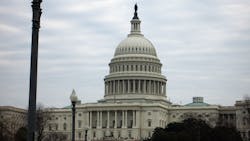Moving Forward Framework is House Dems five-year, $760-billion infrastructure proposal
The U.S. House of Representatives Democrats, led by Transportation and Infrastructure Committee Chair Peter DeFazio (D-OR), Energy and Commerce Committee Chair Frank Pallone (D-NJ) and Ways and Means Committee Chair Richard Neal (D-MA), outlined a five-year, $760-billion infrastructure plan they say will address some of the country’s most urgent infrastructure needs.
“Our country has changed dramatically since the 1950s, yet people and goods are now literally stuck trying to move on transportation networks first developed nearly 70 years ago. It’s past time for transformational investments to make our infrastructure smarter, safer and resilient to climate change, or else we will keep throwing money at an antiquated system that is only holding us and our economy back,” Rep. DeFazio said. “The framework we released today is the launchpad we need to move forward on those transformational investments and curb carbon pollution. In the coming months, I look forward to continuing our work to make this framework a reality. The cost of inaction is too great.”
The framework includes $329 billion for modern highway and highway safety investments including the use of modern technology to create smarter transportation systems, road safety investments to curb the number of pedestrian and bicyclist deaths and increasing the use and availability of charging stations and other alternative fueling options for zero-emission vehicles.
The plan includes $105 billion in transit investment that would increase funding for transit agencies to add new routes and provide more reliable service, increasing investment in zero-emission buses to reduce carbon pollution, reform the Capital Investment Grant program to streamline project delivery so commuters see results faster and funding to address maintenance backlogs.
The framework includes $55 billion in rail investment to expand the nation’s passenger rail network, invest in Amtrak stations, facilities, services and rail car modernization and preserve Amtrak’s “legacy of serving long-distance and intercity passengers.”
The plan has a clear tilt toward sustainability and would include $34.3 billion in clean energy investment.
“There is no better way to strengthen our economy for the future than to modernize our badly aging infrastructure. This bold framework not only helps us rebuild our nation, it also combats climate change by reducing carbon emissions and moving us towards a clean energy future,” Rep. Pallone said.
“Due to decades of underfunding and neglect, America’s infrastructure system is falling apart and we’re falling behind our global competitors. The deficiencies of our roads, bridges, transit, water systems, broadband and electrical grids hold our nation’s economy back,” Rep. Neal said. “When we invest in infrastructure, it results in a significant economic multiplier – with each dollar spent, our nation becomes more competitive and prosperous.”
Reactions from the transportation industry were supportive of the proposal and encouraged continued efforts to deliver on strong federal infrastructure investments.
“The American Public Transportation Association (APTA) applauds House Democratic leaders’ proposed framework to rebuild and expand America’s infrastructure, particularly the focus on critical funding for public transit and passenger rail infrastructure,” said APTA President and CEO Paul P. Skoutelas. “This framework includes important provisions for maintaining and expanding our public transportation infrastructure and represents a commitment to growing our communities, supporting jobs and providing expanded mobility options.”
He continued, “APTA has emphatically urged lawmakers that now is the time to invest more in our nation’s public transportation infrastructure to help our communities provide critical public transit services. Public transportation provides millions of Americans with access to jobs, education and health care. We applaud House leaders for jump starting the infrastructure debate and look forward to working with Congress on a bipartisan basis to move forward with legislation that will repair, maintain and improve our public transit and passenger rail systems today and in the future.”
The American Road & Transportation Builders Association (ARTBA) President & CEO Dave Bauer noted that the proposal is a reminder that infrastructure is a shared concern among Democrats and Republicans.
“The T&I Committee has a history of bipartisanship and the proposals from Democrats and Republicans provide an important foundation for the chamber to deliver on the infrastructure vision both parties have articulated since the 2016 elections,” said Bauer. “All policymakers and stakeholders should be clear-eyed there will be no infrastructure initiative without equivalent passion and commitment devoted to paying for these needed investments.”
He continued, “We urge infrastructure supporters and all relevant committees to work with the Ways & Means Committee to develop and support the robust revenue plan necessary to turn years of infrastructure visions into reality.”

Mischa Wanek-Libman | Group Editorial Director
Mischa Wanek-Libman is director of communications with Transdev North America. She has more than 20 years of experience working in the transportation industry covering construction projects, engineering challenges, transit and rail operations and best practices.
Wanek-Libman has held top editorial positions at freight rail and public transportation business-to-business publications including as editor-in-chief and editorial director of Mass Transit from 2018-2024. She has been recognized for editorial excellence through her individual work, as well as for collaborative content.
She is an active member of the American Public Transportation Association's Marketing and Communications Committee and served 14 years as a Board Observer on the National Railroad Construction and Maintenance Association (NRC) Board of Directors.
She is a graduate of Drake University in Des Moines, Iowa, where she earned a Bachelor of Arts degree in Journalism and Mass Communication.


